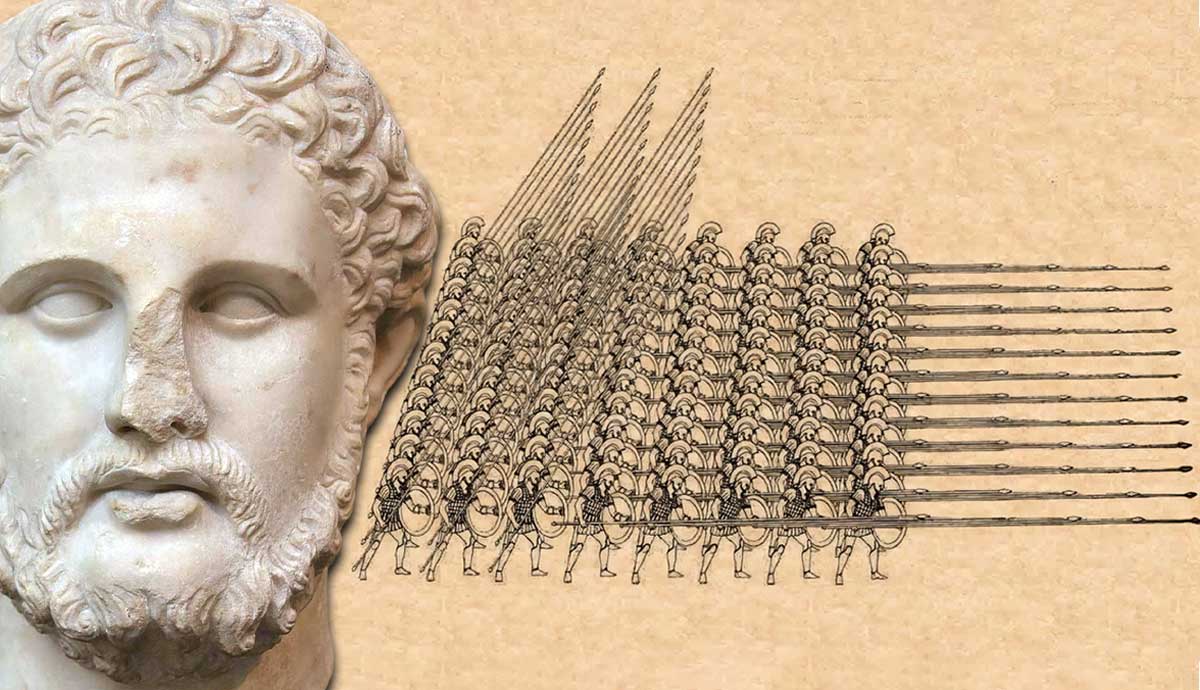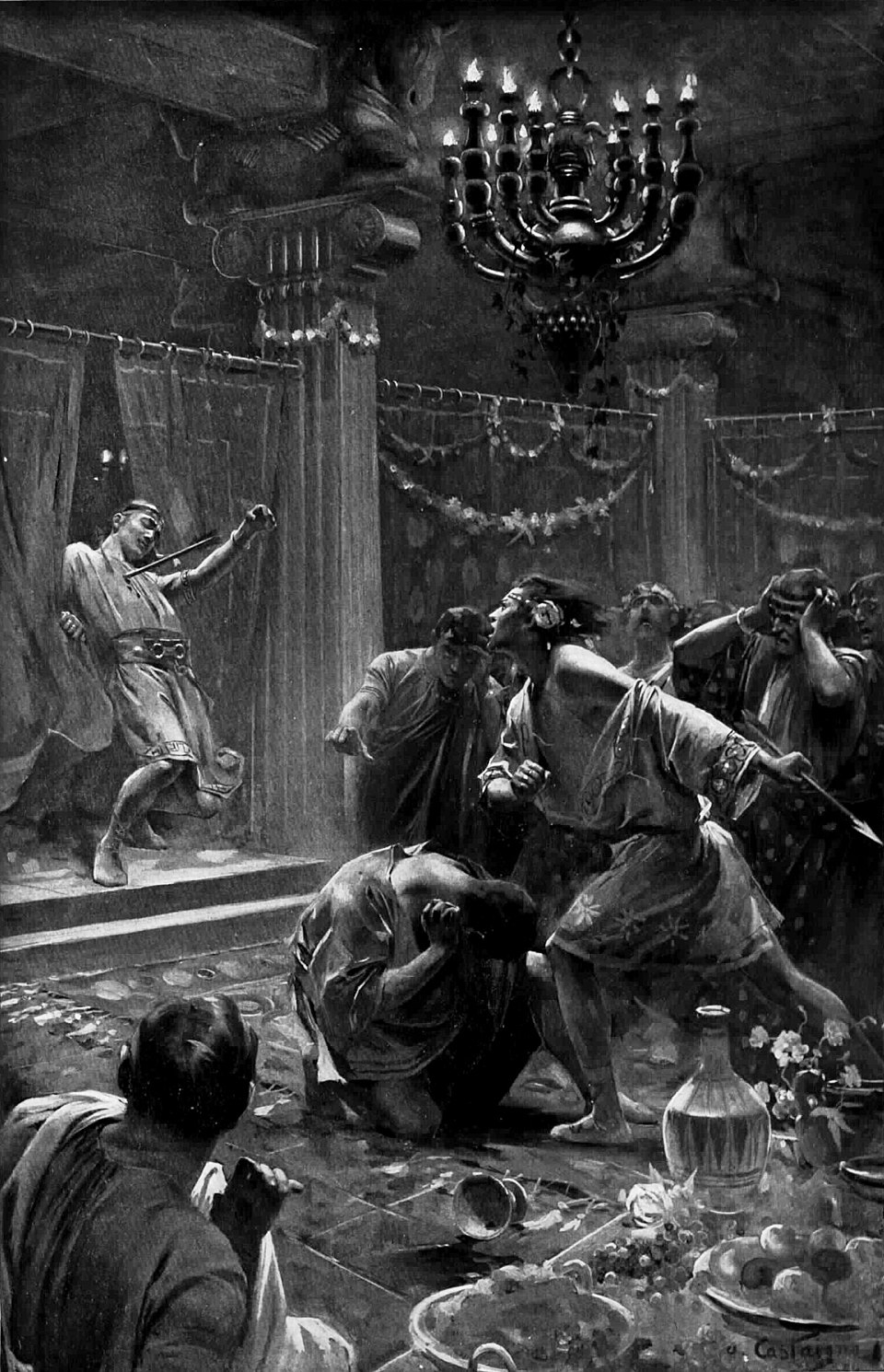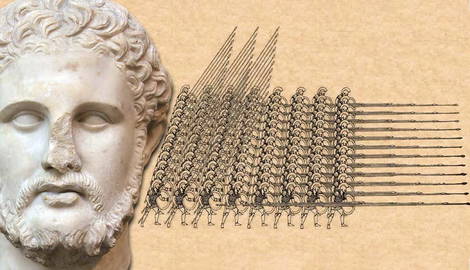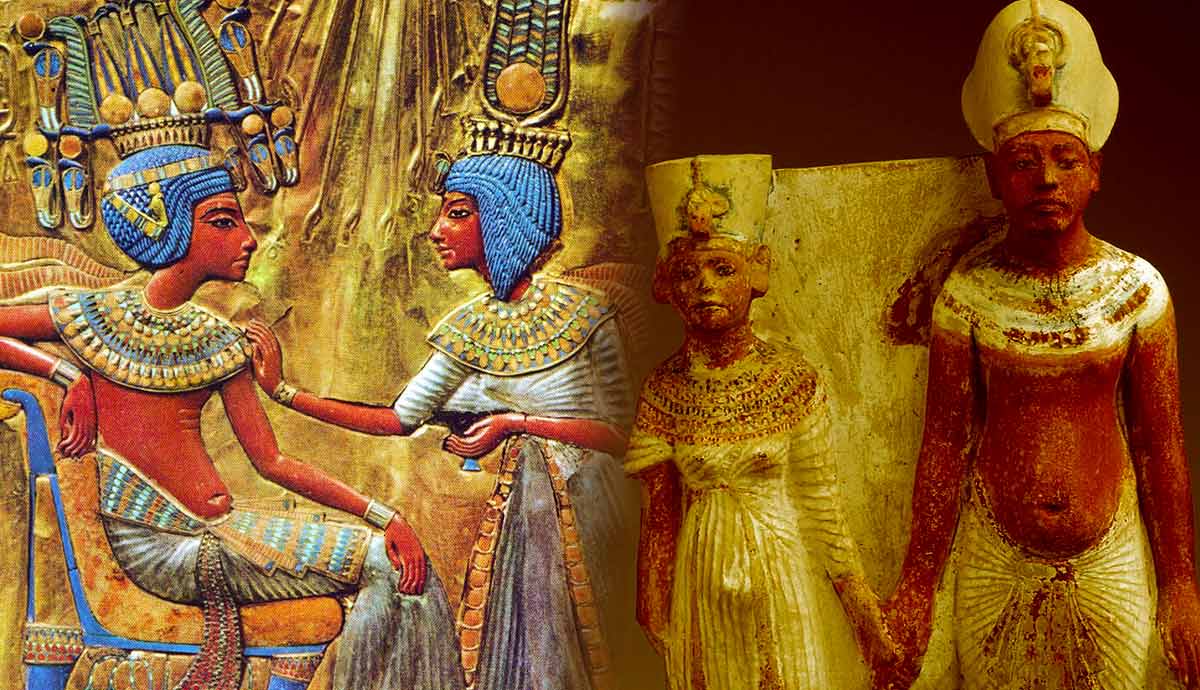
summary
- Father of Alexander the Great: Philip II of Macedon is best known as the father of Alexander, but it was his achievements that enabled Alexander’s Greatness.
- Military Reform: Philip reformed the Macedonian phalanx, introducing the sarissa, and the Companion Cavalry, creating an unstoppable war machine.
- Imperial Expansion: Philip’s military campaigns doubled the size of the Macedonian empire and his political maneuverings gave him control of Greece.
- Invasion of Persia: Philip masterminded the invasion of Persia and had already dispatched advanced forces when he was assassinated; Alexander continued his campaign.
Philip II of Macedon is best known as the father of Alexander the Great, and his accomplishments are often overshadowed by those of his son. But as the saying goes, greatness comes from standing on the shoulders of giants, and for Alexander, Philip was the giant. It was Philip’s military reforms that transformed the Macedonian army into an almost unbeatable weapon. It was his territorial expansion and political manoeuvrings that transformed Macedon from a peripheral state into a major power and established the power base from which Alexander could launch his campaigns of conquest.
Early Life & Rise to Power

Like many great rulers, Philip was never meant to be king. Born around 382 BCE, he was the third son of King Amyntas III of Macedon. His elder brother, Alexander II, was destined to rule, but was assassinated by a powerful courtier. Young Philip was sent away as a diplomatic hostage, first to the Kingdom of Illyria on the Adriatic Sea and then to Thebes. In Thebes, he learned at the feet of the legendary Theban general Epaminondas. These lessons would reshape Greece, Macedon, and the world forever.
Philip returned to Macedon as an adult, and his older brother and king, Perdiccas III, appointed Philip as regent for his young son, Amyntas, while he was on campaign. However, in 359 BCE, Perdiccas was killed in battle against the Illyrian ruler Bardylis. Philip continued as regent for his infant nephew, but quietly sidelined Amyntas IV. He was kind enough not to kill Amyntas and permitted him a life of relative comfort, but he never allowed his nephew anything that might challenge his power.
Philip the Innovator

Philip’s time under Epaminondas fostered his military skill. He embarked on a series of tactical and military reforms that paved the way for Macedon’s future glory. The most important was the introduction of the Sarissa, a long spear roughly twice the length of the traditional dory used in Greek and Macedonian warfare.
Warfare in this period was based around phalanx formations: men armed with spears and shields in a tight formation, providing an unbreakable wall of protective shields and offensive spears. The Greeks had perfected this type of warfare and famously employed it in battles such as Thermopylae and Marathon.
Philip’s sarissa was a simple change, but a profound one. By doubling the length of the spear, he doubled the distance between his own men and the enemy’s weapons. Furthermore, because the spears were so long, additional rows of phalangites could point their spears in front of the formation, creating multiple layers of spears for attackers to get through. This made the Macedonian phalanx almost impenetrable.

Philip also improved the use of cavalry by forming the hetairoi, or Companion Cavalry. This elite heavy cavalry force was comprised of the Macedonian elites and was typically personally led into battle by the king. Usually, the sarissa-equipped phalanx units would hold an enemy in place while the swift hetairoi outflanked the enemy. This combination would be devastatingly effective against the Persians.
Lastly, Philip innovated with the use of siege equipment. He pioneered the use of catapults against the town of Byzantion in 340 BCE and made liberal use of siege towers, battering rams, and early ballistae, named oxybeles. Although he had mixed success with them, his varied and sophisticated array of siege craft equipment would be indispensable to Alexander’s later conquests.
Early Campaigns

Upon seizing power, Philip’s immediate political concern was the Illyrians. Having killed his predecessor in battle, the Illyrians, emboldened by their success, might inspire others to revolt against Macedonian power. Philip marched to meet the Illyrians in the Erigon Valley in 358 BCE, where he decisively defeated them, killing 7,000 Illyrians and slaying their king on the field.
On top of his military acumen, Philip understood the value of marriage as a political tool. He secured the obedience of Illyria through marriage to Princess Audata. He consolidated his control of Elimeia by marrying Phila of Elimeia. Polygamy was not uncommon for kings seeking alliances and multiple heirs. By far Philip’s most consequential union came from Princess Olympias of Epirus in 357 BCE. By all accounts, Olympias was a formidable and wilful woman, and together they quickly conceived a son, whom they would name Alexander.
Philip in Greece

Philip continued his expansion by acquiring the gold-rich territory around the city of Amphipolis in 357 BCE. That same year, he conquered the city of Pydna. These actions directly defied the interests of Athens, bringing Macedon and Athens into intermittent conflict for the next day and embroiling Macedon in the shifting alliances of the Greek world.
Continuously proving himself on the battlefield, Philip wrested multiple cities out of Athenian control with remarkable success, although the city of Methone did cost him his right eye. He then carried his campaigns into Thrace and Thessaly, further expanding Macedonian power at the expense of the Greek city-states.
From 356 BCE, Philip was dragged into the Third Sacred War as an ally of Thebes against the Phocians. Despite initial successes, Philip was defeated in battle by the Phocians, but dusted himself off and redoubled his efforts. He delivered decisive revenge at the Battle of Crocus Field in late 353 or early 352 BCE, where he killed or captured almost 10,000 Phocians. The victory rewarded Philip with effective control of Thessaly and a powerful stake in Greek affairs.
Raising Alexander

Amid his military and diplomatic achievements, Philip still found time to be present in his son’s life. Alexander was not his eldest son; he had another son, Philip Arrhidaeus, by his wife Philinna of Larissa, who was about a year older than Alexander. However, it soon became apparent that he had learning difficulties and was not suited to rule. Plutarch suggested that this may have been the result of a poisoning attempt hatched by Olympias to remove him as a rival to her son. Nevertheless, the two boys seem to have been close, and Alexander later took his brother on campaign with him.
Philip II features in several famous anecdotes from Alexander’s early life, suggesting that the busy general was a present father, although not all of them may be true. For example, it was Philip who tried and failed to tame the horse Bucephalus before Alexander managed to subdue the beast and make him his loyal companion. Philip supposedly wept with joy and told his son to find a bigger kingdom because “Macedon is too small for you.” An unintentionally prophetic prediction for a future conqueror, or a later invention to bolster the heroic destiny in Alexander’s myth? The latter is more likely.

For his part, Philip appears to have trusted Alexander. In one Plutarchian tale, Alexander was trusted to receive Persian ambassadors while Philip was away from court. In another, he entrusted the 16-year-old Alexander with the regency while he was on campaign, during which the young Alexander successfully subdued a rebellion in Macedonian territory.
Many of these anecdotes are dubious, but we do know that Philip made some impressive provisions for his son. Most famously, Philip arranged for Aristotle to personally tutor Alexander, seeing the best possible education for his heir. After his victory at Chaeronea, Philip erected gold and ivory statues of himself, Olympias, and Alexander at Olympia.
Philip Grows His Kingdom

If Macedon really was too small for Alexander, then Philip was doing an excellent job of expanding it for him. From the late 350s to 340s BCE, Philip engaged in a string of campaigns to expand his borders. Philip secured Macedonian dominance over the Balkan hill tribes to the north and east of Thrace. He also tightened his control over Epirus and Illyria in a series of short punitive campaigns after they had become restless while Philip had been focused on Greece. By 342 BCE, he had effectively doubled the size of his kingdom and held it more firmly than ever before.
Meanwhile, in Greece, he used diplomacy to slowly increase his power. He compelled Athens to accept peace in 346 BCE. His decisive role in Greek affairs earned him membership in the Amphictyonic League, signaling his important place in the region. His growing power agitated many of the Greek city-states, especially Athens. The famous statesman and orator Demosthenes delivered five fiery speeches, all of which have survived, condemning Philip as a tyrant who would destroy Greece if given the chance. The Athenians even sent an embassy to Persia asking for support in a war against Philip, but they were denied.
Philip Subdues Greece

In 340 BCE, Philip attempted to besiege the city of Byzantion. This posed a direct threat to Athens’ grain imports from the Black Sea, prompting them to send ships and supplies to repel Philip’s attack. Despite employing his powerful catapults in the siege, the Athenian intervention ultimately forced Philip to withdraw. Their short-lived peace shattered, Philip’s retreat emboldened the Greeks to challenge Macedon’s newfound power.
After Philip licked his wounds and regrouped, he marched back into Greece the following year. By now, even his former Theban allies were unhappy with his dominance and would stand with Athens and several other cities. This culminated in the Battle of Chaeronea in August 338 BCE. Philip’s forces decisively defeated the Athenian and Theban-led coalition assembled against him. Details of the battle are scarce, but we know that Alexander himself rode in the Companion Cavalry alongside his father. Chaeronea was a decisive moment that would end Greek independence.
Philip secured his power using a confederation known by historians as the League of Corinth. This League imposed a political order upon the various city-states, including a mutual peace, with Philip firmly as its hegemon. It was the first time that all of Greece was unified into one political order. Macedon itself was not represented in the League, and Greek cities were free to dispute among themselves on many issues, but Philip’s hegemonic role allowed him to rise above those disputes and, crucially, direct the League’s anger (and military resources) against something far more productive: Persia.
Eyeing Up Persia

The massive Persian empire in the east had endured a series of rebellions and regime changes in recent years. This combination of vulnerability and lavish wealth made for a tempting target. Additionally, the Greeks were still animated by anti-Persian hatred due to the Persian invasion in the 5th century BCE. Using his newfound position in the League of Corinth, Philip could muster the combined military might of Greece to strike out at their ancient enemy.
It was Philip, not Alexander, who sent the first troops eastward into Persia. A preliminary force of several thousand men was sent ahead under the command of Parmenion. They had begun to wrest control of several Greek cities in Asia from Persia by the end of Philip’s life.
In anticipation of this invasion, Philip sought another marriage with a Macedonian woman named Cleopatra Eurydice to secure an additional heir in case Alexander died on the campaign. It was a sound move, but for Alexander, it was a wound to his pride and a sign that his father possibly wanted to replace him. After all, Alexander’s mother was from Epirus, so a son from this Macedonian marriage would technically have a more legitimate claim.
According to Plutarch, an argument broke out about this during the wedding in 337 BCE, which led to Alexander openly mocking his father. The resulting rift in the family made Olympias and Alexander enter voluntary exile in her homeland of Epirus for several months. Alexander was later recalled as the time for the Persian expedition drew near; an expedition that Philip would never see.
The Assassination of Philip

In October 336 BCE, Philip celebrated the marriage of one of his daughters in the city of Aegae. While entering an amphitheater, one of his bodyguards, a man named Pausanias of Orestis, suddenly stabbed him with a dagger. Philip fell and quickly died, ending the life of one of the ancient world’s greatest military minds. Pausanias was quickly killed by Philip’s soldiers, and Alexander was hailed as Philip’s successor.

Our sources disagree on the motive for the attack and who was involved. The simple explanation by Diodorus Siculus is that Pausanias was a spurned lover who killed Philip in a fit of jealousy and rage. In his Politics, Aristotle instead blames a dispute between Pausanias and another Macedonian courtier that Philip failed to resolve in his assassin’s favor.
Others point the finger at Olympias and Alexander. Plutarch says that it was Olympias who fanned the flames of Pausanias’ anger and made him strike down the king. The fact that she was still in exile in Epirus gave her plenty of motive to hate Philip and seek to hasten her son’s rise. Plutarch and Justin both implicate Alexander, although always at arm’s length. He did not plan or order the assassination, but he might have known of the plan and chosen not to stop it.
Modern analyses have failed to settle the debate. Some historians note that Alexander gained nothing from the assassination that he would not have received by simply waiting, but then again, Alexander was not a man renowned for his patience. While there’s no actual evidence linking Alexander to the crime, that has not stopped over 2,000 years of speculation that Alexander earned his throne by murdering the man who raised him.
A Legacy for the Ages

Whatever or whoever motivated Pausanias to kill Philip, we will probably never know. After his assassination, Philip was interred in a marvelous tomb in the city of Aigai, modern-day Vergina in Greece, which archaeologists discovered untouched in 1977. Newspapers ran headlines celebrating the discovery of the tomb of “Alexander’s father,” a man whose modern relevance is almost always bound up with that of his son.
Philip achieved much in his own right. He took the peripheral kingdom of Macedon and turned it into the hegemon of Greece and one of the greatest powers in the Mediterranean. It was Philip who introduced the sarissa that revolutionized warfare for centuries to come, who formulated the League of Corinth, who had first appointed men like Parmenion to positions of power, and it was Philip who had conceived of the Persian campaign in the first place.
Alexander may have built the empire, and he deserves his credit for doing so, but the foundations he stood upon and even the tools he used had been crafted for him by Philip. Alexander’s greatness was possible because he was standing on the shoulders of a giant.

Even the Macedonians in the time of Alexander may have thought that Philip deserved significant credit for the creation of Alexander’s empire. According to one famous anecdote, when Alexander returned from India and was organizing his administration in Persia in 324 BCE, he had a confrontation with Cleitus the Black, an older general who had served under Philip. Unhappy with his reassignment and frustrated with Alexander’s increasingly egotistical behavior, Cleitus mocked Alexander for boasting that his accomplishments were greater than those of Philip. Cleitus claimed that Alexander’s accomplishments were due to his father, and that if Alexander was the son of a god, as he claimed, and not Philip, then he was not the legitimate king of Macedon. This so angered Alexander that he grabbed a spear in killed Cleitus in front of the gathered company. This story suggests that while the history books might place Philip in Alexander’s shadow, Alexander’s ambition was partially motivated by getting out of his father’s formidable shadow.










